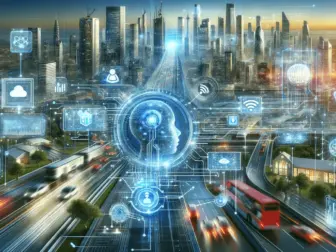Tag - AI Technology
Blog , January 12, 2024 , AI and IoT, AI in IoT, AI Technology, Future of IoT, internet of things, IoT Efficiency, IoT Security, Predictive Maintenance, Smart Technology
The Future of AI Technology: Transforming Industries and Enhancing Lives
Artificial Intelligence (AI) technology has rapidly advanced in recent years, revolutionizing industries and impacting our daily lives in ways we never imagined. From self-driving cars to virtual assistants like Siri and Alexa, AI is becoming increasingly integrated into various aspects of society.
One of the key areas where AI technology is making a significant impact is in healthcare. AI algorithms are being used to analyze medical images, detect diseases at an early stage, and personalize treatments for patients. This has the potential to greatly improve patient outcomes and reduce healthcare costs. For example, AI-powered systems can analyze mammograms to detect breast cancer more accurately than human radiologists, leading to earlier diagnosis and treatment.
In the financial sector, AI technology is being used for fraud detection, risk assessment, and algorithmic trading. Machine learning algorithms can analyze vast amounts of financial data to identify patterns and make predictions about market trends. This is enabling financial institutions to make more informed decisions and manage risks more effectively.
AI is also transforming the way we interact with technology. Virtual assistants like Siri, Alexa, and Google Assistant are becoming more sophisticated, understanding natural language and responding to voice commands. These AI-powered assistants can help us with a wide range of tasks, from setting reminders and making appointments to playing music and answering questions.
In the field of education, AI technology is being used to personalize learning experiences for students. Adaptive learning platforms can analyze student performance data and provide customized recommendations for study materials and learning activities. This can help students learn at their own pace and focus on areas where they need the most help.
AI technology is also driving innovation in the transportation industry. Self-driving cars are becoming a reality, with companies like Tesla, Uber, and Waymo developing autonomous vehicles that can navigate roads safely and efficiently. These vehicles have the potential to reduce traffic accidents, lower emissions, and improve transportation accessibility for people with disabilities.
Despite the many benefits of AI technology, there are also concerns about its potential impact on jobs and privacy. Some experts worry that automation driven by AI could lead to job losses in certain industries, while others argue that AI will create new job opportunities and enhance productivity. Additionally, there are concerns about the ethical implications of AI, such as bias in algorithms and data privacy issues.
Overall, AI technology holds great promise for transforming industries and enhancing lives. As we continue to develop and deploy AI solutions, it will be important to address these challenges and ensure that the benefits of AI are shared equitably across society.
